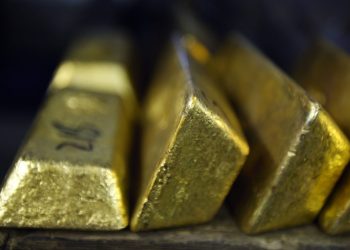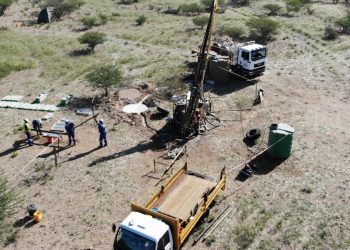
Over the past ten years, B2Gold’s operations in Namibia have contributed N$7.2 billion in taxes and royalties to the government, nearly matching the N$7.1 billion paid out to shareholders.
The Otjikoto gold project, which began commercial production in 2015, has produced an estimated 1.7 million ounces of gold by the end of 2024, averaging between 150,000 and 200,000 ounces annually.
“Over ten years, the government has taken N$7.2 billion. And B2Gold has taken N$7.1 billion. So that seems to be a fair share of wealth that’s sitting in the ground. Plus we invested the capital to actually get access to the resource,” said John Roos, B2Gold Namibia Country Manager.
He said the mine operates with 90% ownership through B2Gold Corporation, listed on the New York, Toronto and Namibian stock exchanges, while 10% is locally owned. It processes 3.4 million tonnes of ore annually, with a gold recovery rate of approximately 98%.
“At Otjikoto, 99% of our workforce is Namibian. Local procurement exceeds 57% of total inputs, and dividends benefit Namibians and are reinvested into the country,” Roos said.
Beyond production, B2Gold has prioritised sustainability and environmental management. The company implements progressive rehabilitation of mined areas, ensuring restoration takes place throughout the mine’s life rather than at closure. By the end of 2025, a dedicated rehabilitation fund will cover all environmental obligations, securing long-term ecological responsibility.
“Since 2018, we have commissioned solar plants at our mines, totalling 17 megawatts, reducing reliance on heavy fuel oil and lowering costs. We aim to expand renewable energy use further despite some legislative limitations,” Roos added.
Corporate social responsibility (CSR) has also been a key focus. Between 2013 and 2024, B2Gold spent US$16.6 million on projects in education, health, the environment and livelihoods. During the COVID-19 pandemic, the company made a one-off donation of US$2 million to the Office of the Prime Minister, reflecting its commitment to national welfare and social support.
“The Rhino Gold Bar project continues to provide returns to entities such as the Save the Rhino Trust. These projects live on beyond Otjikoto Mine’s life and demonstrate sustainable investment,” Roos said.
He added that Namibia’s wider mining sector has also made significant contributions to the economy. In 2024 alone, mining paid N$5.6 billion in taxes, employed 20,000 Namibians, and invested US$1.5 billion in exploration — the highest annual exploration spend in the country’s history.
Since 2013, cumulative CSR spending across the mining sector has totalled N$1.7 billion, supporting education, healthcare, infrastructure and technical training.
Roos noted that Namibia’s stable political environment and regulatory framework continue to attract investment. With 35 years of independence and no major political unrest, he said the country is regarded as a favourable destination for mining companies, enabling B2Gold to grow its operations while maintaining accountability to local communities and the government.
“This is not a technical discussion but a call to action. We must change the narrative about mining in Namibia. Through networks, education and engagement, we can communicate that mining brings significant, long-term benefits to the country and its people,” Roos said.







